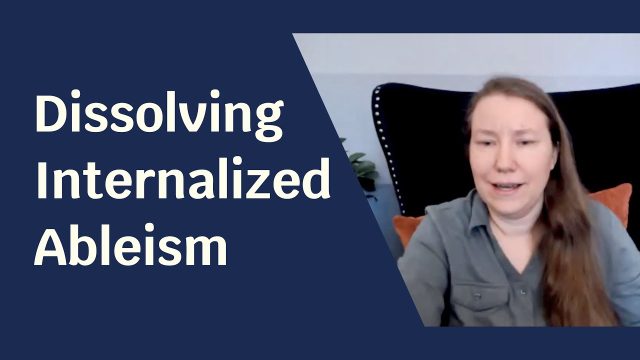
This is an excerpt from my workshop, How to Recover from Autistic Burnout.
What is internalized ableism?
Internalized ableism, as I see, it is a deeply ingrained way of thinking that creates unnecessary pain and distress by comparing your current reality with some fictional ideal of what people should be able to do. It’s that “should” thing that’s really the key.
So if you’re able to let go, (and I’m not saying it just miraculously happens, there are techniques,) but if you’re able to basically reframe what is going on in your life as not, I’m not able to work full time and raise kids, and have them home with me during the pandemic, and take care of my spouse, and maintain social relationships. If I’m not able to do all of that, and have energy left over and have a smile on my face the whole time, it does not mean that I’m a broken human being, it does not mean that I’m not good enough. It means that my nervous system reacts to the world in very different ways than other peoples do.
And that my nervous system needs different things than the standard that has developed in our modern world. And it needs different things than the highly traumatic world that we live in. We live in a world of trauma, it’s generational, it’s surrounding us, it’s in all of our systems, it’s in the way that we think, teach, parent, work, live.
I’m gonna leave it there because I want to get to other things.
Noticing the absolutes
So if you’re interested in dissolving some of this internalized ableism, where I suggest a good place to start would be to notice those times when you think I should, or I have to, or he should or she should, or they should, or that person has to do this in order for whatever, like, notice those have to is in the shoulds the absolutes, and question why, like why should they? Why should I? What would happen if you don’t? What would happen if they don’t? And who benefits by you thinking that?
So a mindset shift that I think was helpful during this dissolving the ableism is to remind yourself that it’s okay for needs and abilities to differ from the perceived norm. To notice that my abilities and my productivity have nothing to do with my worth as a person. To separate moral judgments from actions that aren’t about morality; if you’re not harming someone, and there are other things, but like whether or not the dishes get done tonight does not make me a bad person. If my kids are sticky, I’m still a decent person. Like it does not make me a bad person. There’s there’s so much shoulding that we do, that society does on us.
So what is possible in here, the outcome that’s possible, is to let yourself off the hook for the things that right now might seem non negotiable. At least some of them. And to feel the relief, that I don’t have to be what other people think that I should be in order to be okay. It is possible to embrace your differences as your greatest source of power.
It is possible to embrace your differences as your greatest source of power.
The fact that we do see things differently, that we’re not really in the mainstream, we’re kind of looking at it as an outsider, often, gives us the ability to see it from a different perspective than the people who are in it. Like we can see where the trauma is, we can see where the broken systems are better than a lot of people who are in it. And the fact that we can see that, if we can also develop another area of communicating. in better ways, and I’ll get to that later. But if we can both see what needs to happen, which is one of our strengths as a community, this is one of our biggest sources of power. And we can communicate that in ways that other people can respond to, we have the ability to change the world. And those of us who have more marginalized identities have even more power because you can see more of what needs to be fixed.
Dealing with the ableism
Okay, so a few tools here that I think are helpful, I highly recommend looking into “The Work” of Byron Katie, that’s what she calls it, “The Work”. It’s a series of questions that help you notice the those shoulds those thoughts about the way it should be the way it has to be. I can’t do it like this, I can’t cope, I can’t– all of those, those negative thoughts, the the internalized ableism, and question it. Not to talk you out of it, but to simply get at it from a different perspective, to question with looking for the truth. And to see how those thoughts affect you to see how you affect others when you live into to those thoughts, and to see if there might be a way to turn it around that might actually be just as true or more true.
Another thing that I highly recommend is ACT tools, the Acceptance and Commitment Therapy developed by Steven Hayes. And if you’re looking into it, it’s also another great way to deal with negative thoughts, and to deal with anxiety and lower anxiety’s intensity, so that you can deal with the thing that’s actually underlying it that’s causing the anxiety, which is difficult to do when the intensity is really, really high.
If you’re looking for a form of therapy, I highly recommend the Internal Family Systems model. It’s not about dealing with your family outside, it’s about dealing with your family inside, it’s like that part of you that when I was six was bullied and deals with things this way or that part of me that is trying to protect me from this, like seeing the different parts of you inside as as worthy of compassion, of help, as like they’re trying to help you in the best way that they know how, but they often only have one tool to do so. Anyway, I’m not gonna get into that.
But another tool is a self compassionate inner voice. Being able to respond to yourself with compassion. Even when things go wrong, even when you make poor choices, even when it all goes kablooey.
An Autistic a coach or an Autistic therapist or a neurodiversity supportive therapist can be really helpful in this process. This is kind of my wheelhouse, it’s what I do is dissolving internalized ableism, I love this stuff.
Other things you can look at, books I highly recommend: Martha Beck’s The Way of integrity, the Wisdom of Anxiety by Cheryl Paul, Immunity to Change by Robert Keegan and the Four Agreements by Don Miguel Ruiz. Excellent, excellent books, all of them.
How do you make things better when you have all these responsibilities and or people are not supportive around you? This is it.
And I mentioned before, the most common question I got, which is, how do you make things better when you have all these responsibilities and or people are not supportive around you? This is it. Dissolving internalized ableism will free up the most amount of internal energy and freedom. And it will support you and your ability to do other things. If you can do this, and I’m not saying it’s easy, it’s actually the hardest of all of these things. But if you can do a little teeny bit at a time, moving at the speed of trust, just a teeny bit. And if you can do that, it will make the most difference out of all of these five areas.




